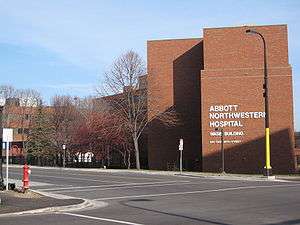Abbott Northwestern Hospital
|
28th Street building of Abbott Northwestern Hospital | |
| Non-profit organization | |
| Industry | Health care |
| Founded | Minneapolis, Minnesota, United States (1889) |
| Founder |
Elizabeth Kenny Harriet G. Walker T. B. Walker Dr. Amos Abbott |
| Headquarters | Minneapolis, Minnesota, United States |
Area served | North America |
Number of employees | 5,347 |
| Website | |
|
Footnotes / references More | |
Abbott Northwestern Hospital is a 627-bed teaching and specialty hospital based in Minneapolis, Minnesota.[1] It is the largest not-for-profit hospital in the Twin Cities[2][3] and a part of the Allina Health network of hospitals and clinics. U.S. News ranked Abbott Northwestern among America's Best Hospitals with six adult specialties ranked in the top 50 in the United States.[4]
History
Abbott Northwestern Hospital was founded in 1882 as Northwestern Hospital for Women and Children. Harriet G. Walker, the wife of prominent Minneapolis businessman Thomas Barlow Walker, invited 44 Minneapolis ladies to a meeting. Although it was billed as a fine social event, Walker actually had the foundation of a charity hospital in mind. Dr. Mary Hood, who attended the birth of Walker's last child Archie, explained the need for a hospital to treat victims of malnutrition, diphtheria, tuberculosis, typhoid, and pneumonia. Dr. Mary Whetstone appealed by saying that no one cared for the people for the worst diseases or "smoothed their dying pillows". Although the typical Victorian women of the time were not used to hearing the details of disease and disadvantaged lives, the ladies donated toward the foundation of a hospital. The first building in late 1882 was a small rented house on 3 1/2 Avenue South and had room for ten patients, two nurses in training, and maids. This facility was hardly big enough for the needs of the community, so it moved to a second home in 1883 at a cost of $3000. In 1887, the hospital moved to a permanent location at the corner of Chicago and 27th Street, at a cost of $36,000. The hospital's care was patterned after Woman's Medical College of Pennsylvania, Dr. Hood's alma mater. Dr. Hood and Dr. Whetstone gave simple, practical care such as diet, cleanliness, and rest. The hospital also established a training school for nurses.[5]
In 1932, Northwestern Hospital celebrated its 50th anniversary. The building at the time could house 200 patients, and was valued at $1,000,000. It had a staff of 81 student nurses, 16 graduate nurses, and 30 other members of its general staff. It was overcrowded at the time, so expansion was needed. Because of the Great Depression, though, it took until 1941 before the west wing and the central pavilion were remodeled and the original hospital building was demolished.[5]
After World War II, health care facilities received increased attention because of the need for care of veterans wounded in the war. Government money was distributed to ensure improved access to health care, and technological advances in cardiovascular and pulmonary surgery techniques, better diagnostic methods, and extended care for critically ill patients received attention. In 1953, the Memorial Pavilion was completed, with a post-anesthesia recovery room, expanded physical therapy facilities, a new classroom, and an electrocardiograph machine. The next year, though, a severe shortage of hospital beds in the Minneapolis–Saint Paul area spurred hospital organizers to organize a United Hospital Fund drive. It raised $17 million for hospitals around the Twin Cities.[5]
In 1964, Northwestern Hospital had 395 beds, along with a medical staff of 244 members and over 1,000 other employees. Around this time, Abbott Hospital had 230 beds. The administrators and board members of the two separate hospitals were concerned about the nation's growth boom, and they also recognized the need for bigger and better facilities, the increase of government regulation, and the growing shortage of trained personnel who could operate increasingly complicated equipment. Since Abbott Hospital and Northwestern Hospital had similar missions and traditions, the two hospitals merged on January 1, 1970.[5]
In 1975 the Sister Kenny Rehabilitation Institute joined to provide rehabilitation care for patients.[6] In 2013, Sister Kenny Rehabilitation Institute and Courage Center merged to create Courage Kenny Rehabilitation Institute one of the largest rehabilitation programs in the Upper Midwest. In 1976, the board of directors of Abbott-Northwestern voted to close the Abbott campus and move its operation to the campus at 27th Street and Chicago Ave. S. This decision was made because it was cheaper to operate one campus instead of two separate hospitals. The consolidation resulted in about the same number of hospital beds, but accomplished a staff reduction of about 180 out of 2700 employees. The new building cost $24 million, was started in 1977, and opened in 1980.[7] In 2005 in a joint venture between the facility and the Minneapolis Heart Institute, Abbott Northwestern's Heart Hospital was created.[6]
On October 3, 2011, Becker's Hospital Review listed Abbott Northwestern under 70 Hospitals With Great Cardiology Programs.[8]
See also
Notes
- ↑ "Abbott Northwestern Hospital". U.S News & World Report. Archived from the original on 12 October 2008. Retrieved 2008-09-25.
- ↑ "About Us". Allina Health. Archived from the original on 19 December 2014. Retrieved 2014-12-19.
- ↑ "Charity Info". 3M Championship. Retrieved 2008-09-25.
- ↑ "Best Hospitals - Abbott Northwestern Hospital". U.S. News & World Report. Archived from the original on 11 September 2008. Retrieved 2008-09-25.
- 1 2 3 4 Where Quality is a 100 Year Tradition: Abbott Northwestern Hospital, 1882-1992
- 1 2 "Hospital overview". Allina Health. Retrieved 2014-12-19.
- ↑ "Board votes to relocate Abbott Hospital by 1980". The Southside Newspaper. February 11, 1976.
- ↑ Rodak, Sabrina (2011-10-03). "Becker's Hospital Review". Beckershospitalreview.com. Retrieved 2012-01-02.
External links
- Abbott Northwestern Hospital
- Abbott Northwestern Hospital on facebook
- Official site of Allina Health
- Official site of the Courage Kenny Rehabilitation Institute
Coordinates: 44°57′12″N 93°15′43″W / 44.95333°N 93.26194°W

